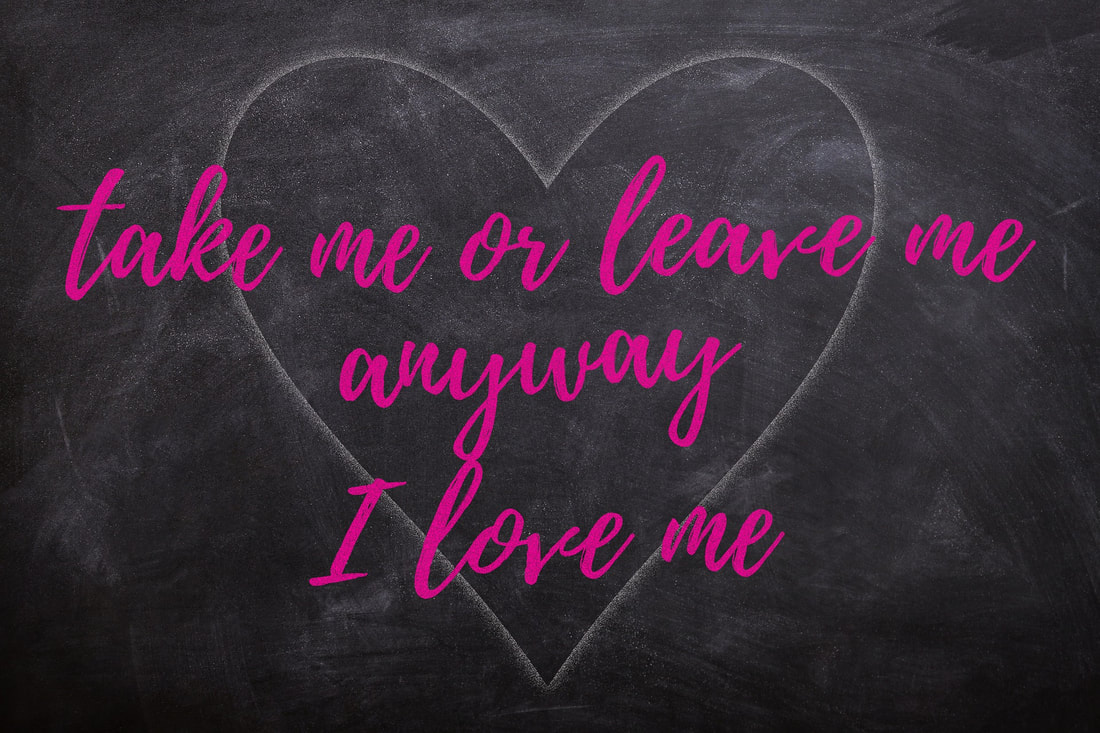|
Loving yourself and being good enough are two concepts that are extremely difficult to define, let alone define in a precise manner. Yet these two notions are frequently subject of discussion in therapy, and we all put a lot of energy, thought and effort in trying to define them and implement them in practice. So, how should we go about it?
A good starting point, perhaps, could be to do a short, 15-minute, meditation with the intention of finding out what is it that we so dislike about ourselves. Therefore, sit down in a comfortable position, take a deep breath in and out, several times, then let the thoughts come up. Don't try to analyze them or fight them, just observe them and notice the sensations in your body. It's quite likely that you will feel shame, disgust, even hatred towards yourself, quite possibly for no particular reason. If you are one of those people who love themselves and have zero problems with negative self-image, then this exercise will not have the same effect on you. But to go back to the negative feelings. This is where you should start your journey of finding self-love. Let's try to take it step by step. Step no. 1: do the brief meditation exercise, which you can, of course, prolong for as long as you want to. Acknowledging that you dislike yourself is a huge step forward. Without it, it is difficult to get to the place of self-love. Step no. 2: step in front of the mirror and negate all the negative thoughts and feelings that you have experienced during meditation. If you think you're stupid and ugly, say to yourself that you are smart and pretty. Continue doing this exercise until you believe in what you're saying. It might also help to do another exercise before this one - stare at yourself in the mirror and smile. You don't have to burst in an uproarious laughter. It suffices to have the corners of your mouth turned upwards. Step no. 3: the next time you're thinking about yourself or seeing yourself in a mirror, think only positive thoughts. Focus on your strengths and positive qualities, no matter how insignificant you think they are. For example, "My hair looks nice today." Or "I've been a truly loyal and reliable friend." Or even "This is the best coffee I've made in a long time." Step no. 4: when you're comfortable in highlighting your positive aspects, you can start analyzing the negative thoughts that come up. Try to figure out where they're coming from. More specifically, from whom! It is very likely that the negative image you hold of yourself is an introject of someone else's negative opinion of you. Step no. 5: know that you are good enough even if you have some negative qualities. We all have them. Try to minimize their expression and do your best to boost the expression of positive qualities. You will start loving yourself as soon as you accept your shadow side, your negative side. When you stop fearing that other people might discover all the "negatives" about you, you will stop feeling shame. Embrace your personality, all of it. Admit you have flaws, like everyone else. Minimize the less pleasant aspects of your behaviour and pledge to change them if they bother you. Change is the only constant thing in life, so even if you're currently not in love with yourself, know that it, too, can change soon. Just focus on the positive! You can do it!
0 Comments
One of the most common issues we deal with in therapy is how to set boundaries. More specifically, how to prevent other people from crossing the boundaries of your privacy or your red lines, and how to prevent them from interfering in your life when it is absolutely no business of theirs to do so.
Surely you have already been subject to your friends or the proverbial mother-in-law meddling in your life and suggesting what you should do and how. Well, sometimes those "suggestions" seem more like orders which you find difficult to counter, even though you absolutely disagree with them. Why is it so? Most likely because you haven't been taught how to set proper boundaries, or limits if you wish. Perhaps you have no idea what boundaries are. There are certain lines that shouldn't be crossed in life, especially when they concern the personal, private life, and the choices of individuals that do no harm to anyone. Though admittedly, your choices might have a negative impact on other people's personal agenda. But then again, that's their problem, not yours, no matter how hard they try to guilt-trip you into believing you're a horrible person when you refuse to follow their plans. The first thing you need to learn in the area of boundary-setting is how to say "no". Such a simple word that many 2-year-olds master without any problems at all, yet so many adults struggle with. Have you ever practiced saying no in front of the mirror? Try it, as it might give you a clue as to how decisive and determined you appear when telling someone you won't do something you dislike. Once you master saying no, you can move on to setting boundaries in other areas of your life that you deem relevant. There is one thing you should be aware, though. Namely, if you set boundaries and then let people cross them as they please, your credibility will be undermined, and nobody will take your limits seriously. Therefore, start setting boundaries in those areas where opposition to them is less likely or, at least, is less likely to lead to a conflict. Practice makes perfect. You need to understand that people will be confused with your decisive stance if you had never stood up for yourself and for what you believe is important. They might even feel offended or upset, but that's for them to deal with. Of course, even those who have lots of experience in setting and sticking to the boundaries, waver from time to time. However, that doesn't prevent them from continuing to uphold the red lines, even though on occasion someone manages to cross them briefly. What matters is that you remain firm and unapologetic when defending what you believe is important to you. If you don't like your friends dictating your life choices, tell them so, politely. If you don't want your mother to raise your children in a way that is not in line with your values and beliefs, tell her to stop. If your boss is pestering you, stop him. There are always ways to prevent and stop unwanted behaviour. If your colleagues are gossiping about you, let them know you're aware of it and take action when you consider they have gone too far. So many things in life happen because we keep quiet, suffer in silence and wait for things to pass or change. They rarely do! Things change when we make the change. Speak up and don't feel bad or guilty about it. Remember, no means no. However, don't take the boundary-setting exercise as a carte blanche to be rude, selfish, aggressive and the like. It's all about finding proper balance. Whenever in doubt, trust your gut feeling. It is rarely wrong. Ending a relationship is never easy, no matter how impossible and frustrating it was. Many people come to therapy to find an answer to the question - should I stay, or should I go? Sadly, therapists can never provide a definitive reply as each and every one must decide for themselves. However, there are some tips that could make your decision easier.
One of the most frequent reasons people start to think about leaving is betrayal. Once one of the partners cheats, the other one is left wondering whether the relationship is still something worth investing in. Betrayal is also one of the most difficult issues to overcome as it undermines one of the fundamentals of a good relationship - trust. If cheating is a one-off thing that happened in specific circumstances, then I would say it is still worth considering staying with a partner and working on how to regain trust and make the relationship stronger. If it is a regular occurrence, then I would certainly leave. Especially if you value loyalty and faithfulness. You know what they say, "once a cheater, always a cheater". Another reason why splitting up is brought into consideration is violence of different types. Violence is where I draw the line. Even more strictly than with cheating. If you're exposed to any kind of violence, especially physical violence, there's not much to reflect upon, really. You pack your bags and leave, or you kick your partner out the door. Sometimes you and your partner simply grow apart. This applies to long-term relationships in particular. If you feel like your relationship is no longer in line with your values, interests, needs and desires, you have the legitimate right to leave. But before you do, assess how you contributed to the relationship getting into a dead-end. Perhaps your partner too would like to go in the same personal growth direction as you, but doesn't know how to go about it. If you feel bored in your relationship, or suddenly start getting frustrated for silly reasons, it might be time to take a look in the mirror and check whether you're projecting your dissatisfaction with yourself onto the relationship. It often happens that we project or transfer our grievances about XYZ onto our partners and blame the relationship for our misery. Should you fall madly in love with someone else, well, tread with caution. Everything that sparkles isn't gold. The shiny, sparkling and exciting new partner might not be as fabulous as you imagine them to be. Also, if you've had a couple of relationships under your belt, you know when you're just smitten with someone and when you're developing real, deeper feelings. One last advice - when you know that leaving is the right option for you, you feel it in your gut. Sure, it helps if someone else whose opinion you value confirms it, but... trust yourself first and foremost as it is you who will have to live with the decision you make. And remember, you can always take a new decision if the last one turns out to be a disaster. Take responsibility for your life and make the most of it! Are you one of those people who eat only to survive or are you one of those who profoundly enjoy food? How would you qualify your attitude to food and eating - is it healthy, unhealthy, addictive? Is food your escape, your comfort, your punishment? Have you ever even noticed how you eat or, what you eat and when?
There is probably something unique to each of us when it comes to our eating patterns and habits. Surely, you have had ample opportunity to observe that during December festivities when eating and drinking were in excess. Some people seem to be constantly on a diet, yet never manage to get to their ideal weight. Others overly indulge in large quantities of unhealthy food and alcohol. There are even some who almost seem to enjoy in the self-inflicted torture of vehemently rejecting any food intake. A few lonely souls on this planet believe food is their only friend. We could say that many people have a rather unhealthy relationship with food. But what does that say about them? The thing with food is that our troublesome attitude to it can quickly turn into an obsession and even more rapidly develop into an eating disorder. Various types of eating disorders exist, and the list of new ones is growing. What they all have in common, though, is a deep dissatisfaction, suffering even, of the person affected by them. Very often, the unhappiness with the body is but a cover for a deeper issue troubling them. Sure, it all starts out as a desire to lose weight or become more muscular, more toned, prettier. However, the real reason for all the dieting is hiding beneath the suppressed needs and desires of which the person might not even be aware of. Initially, when results are slowly showing, people are exalted and feel worthy again. Alas, the feeling never lasts long and the frustration of having to give up on something they love starts creeping in. Many discover that despite attaining the goal their overall satisfaction with life and themselves is still at an all-time low. Why? Because almost always, eating disorders are related to the feeling of being in control. People who feel like their life is spinning out of control, or who are frustrated by something that is beyond their power, start focusing on food because it's the only thing they still have some say over. Or so they believe, as food soon takes control over them. Overeaters often try to suppress their negative emotions and the feelings of worthlessness by stuffing themselves with lots of unhealthy food. For a moment they find comfort and solace in it. Sometimes, overeating is their cry for help, and they hope someone will notice them suffering and come to their rescue. Those who don't have an eating disorder, yet are extremely strict and rigid about their eating, frequently don't know how to enjoy life. They seem to be punishing themselves all the time without knowing it. To them, life is work and no play. They believe enjoying a good meal over a fun dinner with friends is not allowed as they associate life with rigidity, sacrifices and pain. How about those who seem to enjoy food and wine almost too much? Well, they tend to consider themselves above all others. At least on the surface. Beneath it all, they feel like frauds and fear that someone might unveil the embarrassing truth about them. They act as if rules and limitations don't apply to them. Sadly, their debauchery often masks the underlying depression they can't seem to shake off. These bon vivants give the impression of being masters of their life. Deep down, though, they too are unhappy with themselves. Frequently, they seem to compensate the lack of professional, personal or relational success with their larger-than-life attitude. And what better way to demonstrate it than sitting at the table and eat life with a big spoon! Therefore, they need to ostentatiously show to everyone that the world is their oyster. Of course, as always, these are but some possible reasons as to why people act the way they do at the table. Take it as food for thought and try to notice for yourself what kind of eating patterns you engage in and when. It just might help you get to the bottom of what's really eating you up. |
Katarina's Principle:“If we want to change the world, we need to talk about the elephant in the room. That is why I love real people who say what they mean and mean what they say. No fluff, no lies and no pretence.”
Archives
March 2024
Categories |






 RSS Feed
RSS Feed
